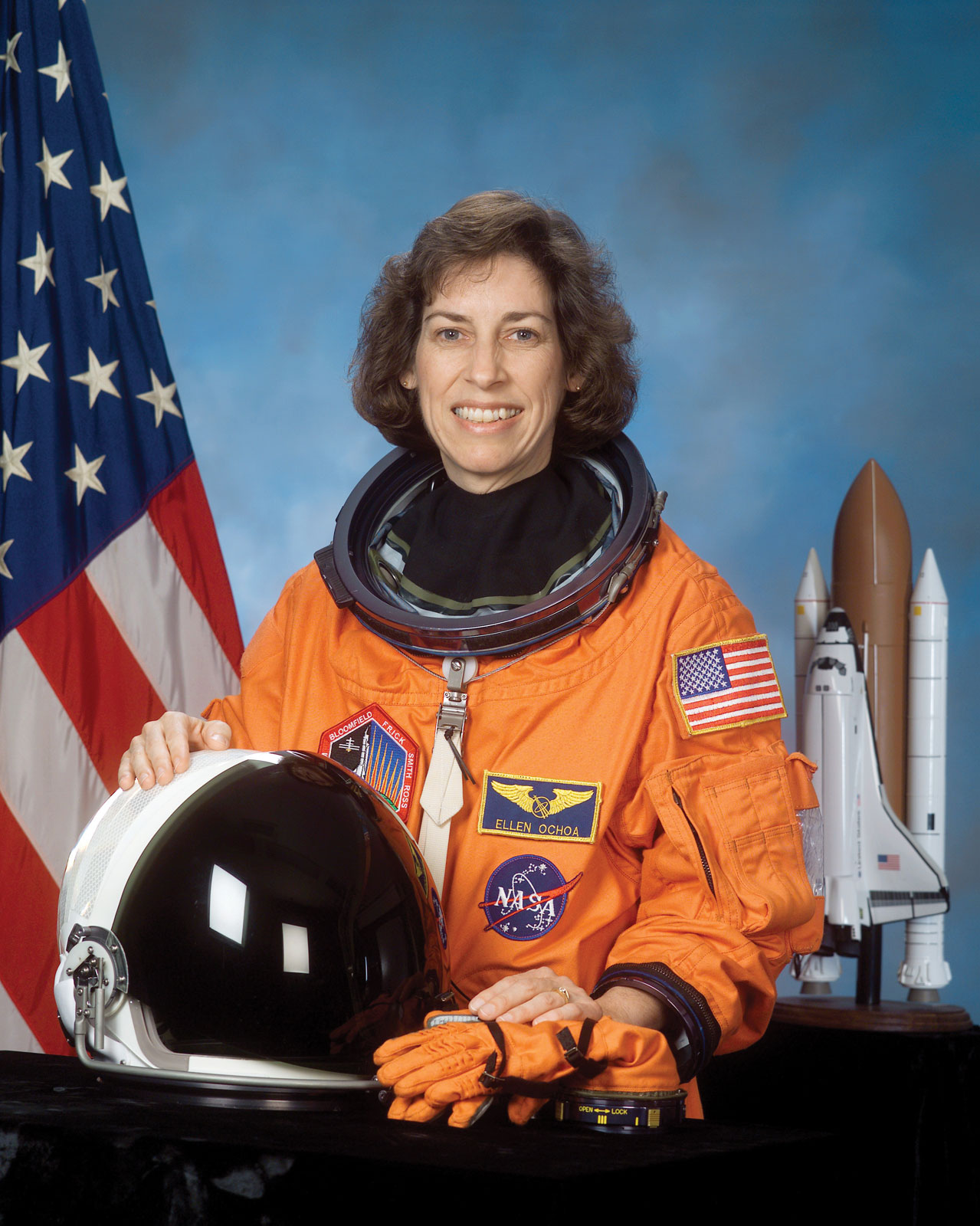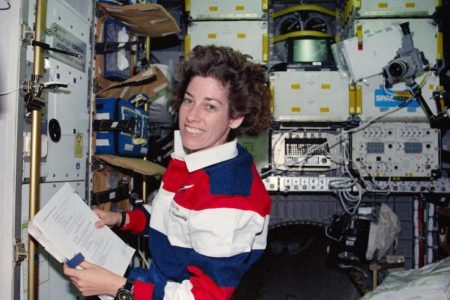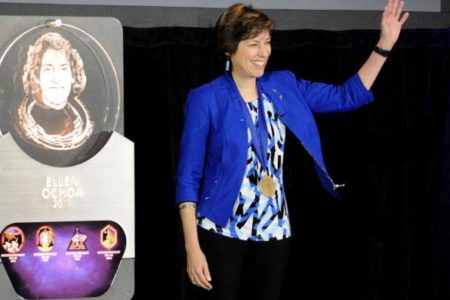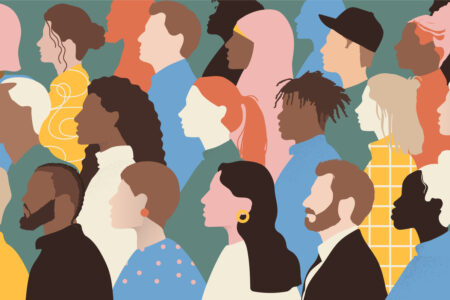Share On Social!
In 1993, Ellen Ochoa became the first Latina person in space.
She logged nearly 1,000 hours in orbit across four space missions, studying the Earth’s ozone layer. She would later become the NASA Johnson Space Center’s first Latina director and only its second female director.
“At the time, it was really a personal thing,” Ochoa told TODAY. “It was something I was very excited to participate in, and I loved working with the team and with my crew and doing work that was important to understanding changes in the atmosphere.”

“I realized the mission had repercussions well beyond that. I had the opportunity to talk to a lot of student groups, I was featured in children’s books, textbooks – I’m just really grateful there was this whole extra dimension to that flight beyond the major goal of it.”
Upbringing and Career as a Latina Astronaut
Ochoa was born in 1958 in Southern California to Joseph and Rosanne Ochoa.
Her paternal grandparents immigrated from Sonora, Mexico.
In school, she was teased for liking science. This inspired her to push for representation in science and technology.
After graduating high school in 1975, Ochoa earned her bachelor of science degree in physics from San Diego State University. She graduated Phi Beta Kappa. Ochoa then earned a master of science degree and a doctorate from Stanford in 1981 and 1985, respectively.
In 1985, Dr. Ochoa applied to the NASA space program.

“When I joined NASA, one of the first things I noticed was more women working there, so it was clear they made a concerted effort at diversity in the workforce, but 30 years ago you didn’t see those same people as leaders as center directors or leaders at NASA headquarters,” Ochoa told TODAY.
Ochoa was inspired by astronaut Sally Ride, a fellow Los Angeles native and Stanford University graduate who became the first American woman in space in 1983.
NASA selected Ochoa for its astronaut program in 1990.
She completed her training in July 1991.
“In April 1993 she served as mission specialist aboard the STS-56 mission of the space shuttle Discovery, becoming the first Latina to be launched into space,” according to Britannica. “During this mission, she and the other mission specialists performed various experiments collectively called ATLAS-2 (Atmospheric Laboratory for Applications and Science-2) that studied the Sun and its interaction with Earth’s atmosphere. The crew also released the SPARTAN satellite, which studied the solar wind for two days before it was retrieved.”
Ochoa also participated other space missions in 1994, 1999, and 2002.
“I felt like I was contributing to something larger than myself, that benefits people on Earth, and I was willing to take the risk,” Ochoa told the Harvard Gazette.
Life after Space for Ochoa

Ochoa retired as an astronaut in 2007.
She then started working for the Johnson Space Center, first as a deputy director and eventually as the Center’s 11th director.
Ochoa was the first Hispanic or Latino person and the second woman to hold the position. During her tenure as director, from 2013 to 2018, she oversaw crucial research and exploration projects, such as the first Orion flight test.
“During her tenure she notably oversaw work on the Orion, which was scheduled to travel farther than other crewed spacecraft, allowing for human exploration of such destinations as Mars,” according to Britannica.
NASA has given her its highest award, the Distinguished Service Medal. She also has the Presidential Distinguished Rank Award for senior executives in the federal government, and honorary degrees from the University of Pennsylvania, Johns Hopkins University, and Worcester Polytechnic Institute.
Ochoa remains active as a member of the American Association for the Advancement of Science (AAAS), the American Institute of Aeronautics and Astronautics (AIAA), the National Academy of Inventors, and the Optical Society of America.
She is also chair of the National Science Board (NSB). The NSB runs the National Science Foundation.
Ochoa’s Lasting Legacy for Latinos
Ochoa, now 63, is a powerful advocate for girls and minorities in STEM fields (science, technology, engineering, or math).
She is often profiled in books and website. She also has at least six schools named after her.
“I know that role models make a difference, and I take seriously that part of my career and life,” Ochoa told the National Women’s History Museum.
“For young Hispanic women, there are few well-known women in STEM fields so it’s even more important to let them know about the interesting and rewarding careers that they can pursue.”
How Can You Help Latinos Fight for Health Equity?
We can do our part to push for health equity for Latinos and other people in your area.
Get a “Health Equity Report Card” for Your Area!
Select your county name and get a customized Health Equity Report Card by Salud America! at UT Health San Antonio. You will see how your area stacks up in housing, transit, poverty, health care, healthy food, and other health equity issues. These compare to the rest of your state and nation.
You can email your Health Equity Report Card, share it on social media, and use it to make a case for community change.
“Share an interactive version of your local Health Equity Report Card to make the case to address existing inequities and strengthen your community’s ability to respond to and recover from disasters so everyone has a fair opportunity to live their healthiest lives possible,” said Dr. Amelie G. Ramirez, director of the Salud America! Latino health equity program, funded by the Robert Wood Johnson Foundation and based at the Institute for Health Promotion Research in the Department of Population Health Sciences at UT Health San Antonio.
Get your Health Equity Report Card!
Editor’s Note: Main image from Energy.gov via ShareAmerica.
By The Numbers
3
Big Excuses
people use to justify discriminatory behavior
This success story was produced by Salud America! with support from the Robert Wood Johnson Foundation.
The stories are intended for educational and informative purposes. References to specific policymakers, individuals, schools, policies, or companies have been included solely to advance these purposes and do not constitute an endorsement, sponsorship, or recommendation. Stories are based on and told by real community members and are the opinions and views of the individuals whose stories are told. Organization and activities described were not supported by Salud America! or the Robert Wood Johnson Foundation and do not necessarily represent the views of Salud America! or the Robert Wood Johnson Foundation.



